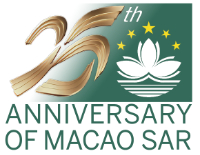Macao is a sometimes overlooked jewel in the Pearl River Delta. The expansion and diversification of its economic base have allowed it to achieve remarkable economic growth and improved living standards during its transformation since its return to China 25 years ago.
 The Macao Special Administrative Region’s gross domestic product has surged from $6.5 billion in 1999 to $47.1 billion by 2023. This significant growth, coupled with the rise in per capita GDP to $66,835 in 2023 from $15,388 in 1999, paints a promising picture for Macao’s economic direction.
The Macao Special Administrative Region’s gross domestic product has surged from $6.5 billion in 1999 to $47.1 billion by 2023. This significant growth, coupled with the rise in per capita GDP to $66,835 in 2023 from $15,388 in 1999, paints a promising picture for Macao’s economic direction.
Since 2023, the Macao Special Administrative Region government has implemented a “1+4” strategy to promote diversification and development. The “1” focuses on enhancing the integrated tourism and leisure industry to establish Macao as a world center of tourism and leisure. The “4” focuses on advancing four key sectors: traditional Chinese medicine, modern financial services, high technology, and the conventions, exhibitions, trade, culture and sports industries, with the aim of creating a sustainable industrial framework tailored to Macao’s needs and supporting national development. Its integration into the Guangdong-Hong Kong-Macao Greater Bay Area and the Belt and Road Initiative has further solidified its role in national development.
 However, the Guangdong-Macao In-Depth Cooperation Zone in Hengqin is the most powerful testament to the “one country, two systems” model, showcasing the potential for collaboration and innovation in a dynamic environment. Joint governance from Guangdong and Macao allows seamless access.
However, the Guangdong-Macao In-Depth Cooperation Zone in Hengqin is the most powerful testament to the “one country, two systems” model, showcasing the potential for collaboration and innovation in a dynamic environment. Joint governance from Guangdong and Macao allows seamless access.
Located just minutes from Macao, Hengqin is an ideal hub for startups and technology companies in medicine, finance and innovation. With a population of 43,000, the area experiences a steady influx of visitors daily, underscoring its increasing importance. The zone offers a competitive tax environment, featuring a 15 percent maximum income and corporate tax rate, significantly lower than the typical rates found elsewhere.
Some of the most interesting initiatives in Hengqin include a state-of-the-art Chinese medicine research and development facility which can accommodate 300 researchers and 700 students. Similarly, the launch of autonomous vehicles, including the Ontime Robotaxi and a self-driving minibus with low fares, showcases the zone’s commitment to innovation. Major financial institutions such as the Bank of China and the Industrial and Commercial Bank of China are also active there, facilitating banking and wealth management services.
While the Guangdong-Macao In-Depth Cooperation Zone in Hengqin exemplifies the progressive and innovative vision, the Cotai Strip, widely known for its dazzling resorts and entertainment options, exemplifies Macao’s development as a leading destination for luxury and leisure.
Macao has been recognized as the “Best Convention City (Asia)” and “Best BT-MICE City” for 2023 and 2024, a significant achievement in a highly competitive environment. Forbes Travel Guide’s recognition of Macao as having the most five-star hotels globally further assures the quality and appeal of Macao as a travel destination.
Macao’s 25th anniversary is a remarkable example of a transformative journey under the “one country, two systems” framework, where the past and present coexist beautifully. The city continues to evolve, promising unforgettable experiences through its unique blend of innovation, culture, cuisine and hospitality
The SAR is also considered home to the world’s first fusion cuisine, combining a vibrant tapestry of culinary traditions shaped by its unique and intriguing blend of Chinese and Portuguese influences. As a result, UNESCO recognized Macao as a “Creative City of Gastronomy” in 2017. Its distinctive and diverse food culture enriched by culinary practices from Africa to Brazil and Japan makes it a brilliant destination for food lovers.
Macao’s UNESCO recognition reflects its public and private sector’s long-term strategy. It views gastronomy as a vital driver for fostering cultural diversity and promoting sustainable economic growth. Six percent of the workforce is employed in the culinary sector, with young people aged 25 to 34 making up around 30 percent of this workforce. Since the designation, Macao has continued to work hard to embrace change and develop initiatives to promote a sustainable food culture. It hosts events like the Macau Food Festival and has launched various programs to support local gastronomy.
Macao recently received another accolade when it was named “Culture City of East Asia 2025” as part of a collaborative initiative instigated by the leaders of China, Japan and South Korea, reflecting the spirit of their trilateral discussions. As the first event to recognize cultural cities in Asia, this initiative represents a significant milestone in fostering cooperation in the humanities among the three nations.
This recognition again reflects stakeholders’ efforts to diversify the economy away from gaming toward a dynamic, family-orientated contemporary culture competing with other places on the global stage.
Portuguese architecture and traditional Chinese temples create a unique atmosphere and provide visitors worldwide with an extraordinary opportunity to experience a fantastic blend of history combined with world-class facilities and exceptional service. The historic center of Macao has been designated a UNESCO World Heritage site and showcases over 20 significant landmarks, reflecting the city’s rich historical legacy.
Arts and culture are integral to the territory’s identity, reflecting its unique blend of Eastern and Western influences. The city boasts a variety of cultural institutions, such as the Macao Museum of Art, which features contemporary works by local and international artists, and the Dom Pedro V Theatre, known for its diverse performances, including opera and traditional Chinese music.
The rich history of Macao supports a vibrant community of artisans celebrated for their hand-painted porcelain and intricate lacework. Festivals like the International Fireworks Display Contest and the Macao Arts Festival offer locals and visitors a chance to engage with the city’s cultural heritage. Additionally, Macao is a haven for leisure and recreation, with attractions like Macau Tower providing thrilling experiences, such as bungee jumping and sky walking, with breathtaking views from its observation deck.
The renowned Macau Grand Prix is the highlight of the Macao sporting calendar. Other notable events include the FIVB Volleyball World Grand Prix, the Macau Golf Open, the Macau Squash Open, the Macau Open Badminton Championships and the Macao International Marathon.
It is hardly surprising that recent surveys indicate that it has become a top destination for Chinese mainland tourists, drawn by its welcoming atmosphere, high-quality services, rich cultural offerings and family entertainment.
Macao’s 25th anniversary is a remarkable example of a transformative journey under the “one country, two systems” framework, where the past and present coexist beautifully. The city continues to evolve, promising unforgettable experiences through its unique blend of innovation, culture, cuisine and hospitality.
The author is an international partner and member of the Global Advisory Board, MilleniumAssociates AG.
The views do not necessarily reflect those of China Daily.


